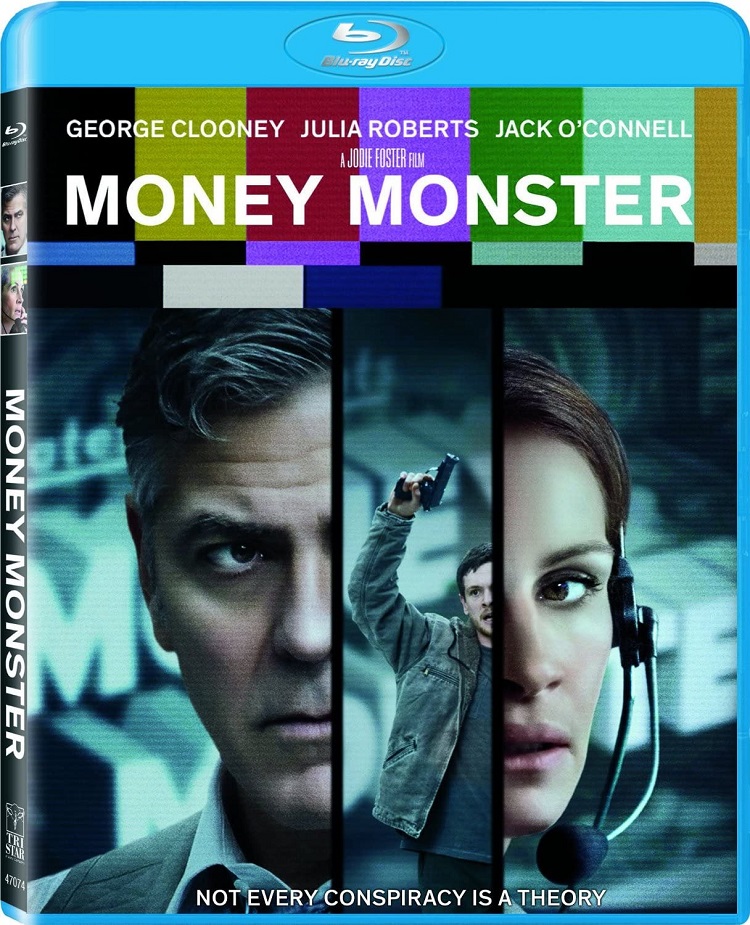
Written by Kristen Lopez
In the wake of the financial crisis of 2008, Hollywood did everything to help audiences understand what happened in a multitude of ways, from the serious, jargon-heavy work of Margin Call to the light-hearted, if condescending discussion in last year’s Oscar-nominated film The Big Short. With an audience already aware of how heartless corporations, and, more specifically, investment companies are, Jodie Foster’s Money Monster can only ever come off as a well-informed also-ran.
Lee Gates (George Clooney) is the unlikable anchor of a popular investment program called Money Monster. When an unstable man (Jack O’Connell) straps a bomb to Gates, demanding answers about an investment company’s $800 million loss, Gates will have to work alongside the bomber to get answers.
Money Monster wants to appeal to all audiences, or at least find the audience who both appreciated Margin Call’s harsh financial realities and The Big Short’s humor. The inspiration it wears proudly on its chest, though, is the 1976 Sidney Lumet film Network. Its Howard Beale-esque man with nothing to lose becoming a face for change and accountability through the power of the media is admirable, but Foster is no Lumet and three credited screenwriters can’t make up the power of one Paddy Chayefsky.
Foster fancies Money Monster as a satire or black comedy, but there’s little intellect on display that isn’t remarkably surface level, and her attempts at humor are too broad. A subplot involving a producer testing out erectile-dysfunction cream goes absolutely nowhere, and serves to give the film its lone sex scene while lines of dialogue that could have serious, emotional ramifications are met with guffaws from the crowd. These moments of levity feel like they want to provide bleakly black humor, but instead leave the audience with uncomfortable chuckles. My audience howled with laughter like they were watching the latest Adam Sandler comedy during the scene where O’Connell’s Kyle is called a bitch by his pregnant girlfriend. The audience chortled more over his being called a bitch as opposed to responding to his character’s emasculation and continued failures.
Nearly every stereotype and character cliche plays out to the detriment of a female filmmaker who has discussed furthering women in cinema. So it’s a shame that two characters of the opposite gender who work together are revealed to be having an illicit affair, or that the entire third act boils down to three white men seeking catharsis with the women safely escorted out of the building.
Julia Roberts as Patty, who oversees Money Monster, and Outlander’s Caitriona Balfe as Diane Lester, the corrupt investment company’s COO, are the film’s highlights. They’re both strong women able to stand toe-to-toe with their respective bosses, but it’s difficult balancing their strength with the fact that said bosses include a misogynist (Gates) and a manipulative, philandering criminal (Dominic West). Foster leaves the women to be the film’s voice of reason, Patty literally being the voice in Lee’s ear, solving the crime but not actively engaged in the final outcome (or, again, removed before their pretty heads are threatened). They have no stakes short of saving a man.
Money Monster also has a troubling racial component that it’s doubtful the screenwriters thought of at the time. Kyle’s plan involves a bomb and a gun, yet the film desperately wants the audience to sympathize with him despite his continued threats and, in the third act, actual act of violence. At one point, when Kyle is thrown on the ground, Clooney’s Gates yells “He can’t breathe,” that can only conjure up images of the murdered Eric Garner in the most pointed of several instances where the audience is left wondering how this film would have treated the character had Kyle been black. Coupled with the big-bootyed backup dancers on Gates’ show, the whole thing has a severe scent of white privilege. Money Monster isn’t about a universal cry for corporate accountability, but a world where white males are allowed to take action, violent and downright terroristic action if necessary, in order to accomplish things that will, presumably, benefit everyone.
Its dream presentation, though troubling, all boils down to an “I did it” declaration that just seems juvenile. Robert and Balfe are stellar while Clooney continues his trend of phoning in his performances, and Jack O’Connell just leaves me wondering why he’s touted as the next big thing. Money Monster will play well on TNT on a Saturday morning. Its a polished example of controlled chaos with a fairy-tale presentation touting buzzwords like “transparency” that leaves this more of a monstrous mess than anything else.